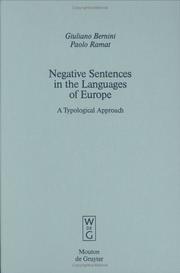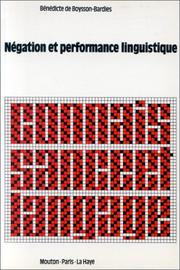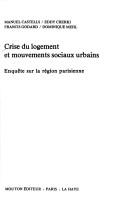| Listing 1 - 6 of 6 |
Sort by
|
Book
ISBN: 3261050306 Year: 1982 Volume: 2 Publisher: Berne Lang
Abstract | Keywords | Export | Availability | Bookmark
 Loading...
Loading...Choose an application
- Reference Manager
- EndNote
- RefWorks (Direct export to RefWorks)
Semantics --- Grammar, Comparative and general --- Sémantique --- Négations (Linguistique) --- Negatives --- Sémantique --- Négations (Linguistique)

ISBN: 3110140640 1306398606 3110819740 9783110819748 9783110140644 Year: 1996 Volume: 16 Publisher: Berlin Mouton De Gruyter
Abstract | Keywords | Export | Availability | Bookmark
 Loading...
Loading...Choose an application
- Reference Manager
- EndNote
- RefWorks (Direct export to RefWorks)
Grammar --- Grammar, Comparative and general --- Typology (Linguistics) --- Négations (Linguistique) --- Quantificateurs (Linguistique) --- Phrase (Linguistique) --- Typologie (Linguistique) --- Negatives --- Quantifiers --- Sentences --- Europe --- Languages --- Langues --- Negatives. --- Quantifiers. --- Sentences. --- Languages. --- Typology (Linguistics). --- Négations (Linguistique) --- Language and languages --- Linguistic typology --- Sentences (Grammar) --- Quantifiers (Linguistics) --- Negatives (Grammar) --- Typology --- Linguistics --- Linguistic universals --- Classification --- Philology
Book
ISBN: 3906768015 Year: 2004 Volume: 64 Publisher: Bern Lang
Abstract | Keywords | Export | Availability | Bookmark
 Loading...
Loading...Choose an application
- Reference Manager
- EndNote
- RefWorks (Direct export to RefWorks)
French language --- English language --- Second language acquisition. --- Grammar, Comparative and general --- Français (Langue) --- Anglais (Langue) --- Langue seconde --- Négations (Linguistique) --- Negatives. --- Negatives --- Négations --- Acquisition --- Français (Langue) --- Négations (Linguistique) --- Négations --- Second language acquisition --- Second language learning --- Language acquisition --- Negatives (Grammar) --- Langue d'oïl --- Romance languages --- Germanic languages --- Study and teaching&delete& --- Italian speakers --- Spanish speakers --- Study and teaching --- Linguistics --- Philology
Book
ISBN: 9780521792400 0521792401 9780511975288 9781316606445 9781139158749 1139158740 1283342154 9781283342155 9781139160797 1139160796 0511975287 9781139156981 1139156985 9781139156981 1107218098 1139152416 1139159798 9786613342157 1139155237 1316606449 Year: 2011 Volume: 127 Publisher: Cambridge Cambridge University Press
Abstract | Keywords | Export | Availability | Bookmark
 Loading...
Loading...Choose an application
- Reference Manager
- EndNote
- RefWorks (Direct export to RefWorks)
Many languages include constructions which are sensitive to the expression of polarity: that is, negative polarity items, which cannot occur in affirmative clauses, and positive polarity items, which cannot occur in negatives. The phenomenon of polarity sensitivity has been an important source of evidence for theories about the mental architecture of grammar over the last fifty years, and to many the oddly dysfunctional sensitivities of polarity items have seemed to support a view of grammar as an encapsulated mental module fundamentally unrelated to other aspects of human cognition or communicative behavior. This book draws on insights from cognitive/functional linguistics and formal semantics to argue that, on the contrary, the grammar of sensitivity is grounded in a very general human cognitive ability to form categories and draw inferences based on scalar alternatives, and in the ways this ability is deployed for rhetorical effects in ordinary interpersonal communication.
Lexicology. Semantics --- Grammar --- Pragmatics --- Polarity (Linguistics) --- Grammar, Comparative and general --- Semantics. --- Polarité (Linguistique) --- Négations (Linguistique) --- Syntaxe --- Sémantique --- Negatives. --- Syntax. --- Semantics --- Negatives --- Syntax --- Polarity --- (Linguistics) --- (Linguistics). --- Polarité (Linguistique) --- Négations (Linguistique) --- Sémantique --- Formal semantics --- Semasiology --- Semiology (Semantics) --- Comparative linguistics --- Information theory --- Language and languages --- Lexicology --- Meaning (Psychology) --- Negatives (Grammar) --- Polarity item (Linguistics) --- Linguistic analysis (Linguistics) --- Arts and Humanities --- Language & Linguistics --- Linguistics --- Philology --- Grammar, Comparative and general - Negatives --- Grammar, Comparative and general - Syntax --- Grammar, Comparative and general Syntax

ISBN: 2719304166 2713200261 9782719304167 Year: 1976 Volume: 4 Publisher: Paris Mouton
Abstract | Keywords | Export | Availability | Bookmark
 Loading...
Loading...Choose an application
- Reference Manager
- EndNote
- RefWorks (Direct export to RefWorks)
Grammar --- Grammar, Comparative and general --- Psycholinguistics --- Children --- Négations (Linguistique) --- Psycholinguistique --- Enfants --- Negatives --- Language --- Langage --- -Psycholinguistics --- -801.56 --- Childhood --- Kids (Children) --- Pedology (Child study) --- Youngsters --- Age groups --- Families --- Life cycle, Human --- Language, Psychology of --- Language and languages --- Psychology of language --- Speech --- Linguistics --- Psychology --- Thought and thinking --- Comparative grammar --- Grammar, Philosophical --- Grammar, Universal --- Philosophical grammar --- Philology --- Syntaxis. Semantiek --- Psychological aspects --- Grammar, Comparative --- Psycholinguistics. --- Language. --- Negatives. --- 801.56 Syntaxis. Semantiek --- Négations (Linguistique) --- 801.56 --- Negatives (Grammar) --- Language development in children --- Interpersonal communication in children --- Vocabulary --- Grammar, Comparative and general - Negatives --- Children - Language --- SYNTAXE --- NEGATION

ISBN: 2719304468 2713200644 9782713200649 9782719304464 Year: 1976 Volume: 5 Publisher: Paris Mouton
Abstract | Keywords | Export | Availability | Bookmark
 Loading...
Loading...Choose an application
- Reference Manager
- EndNote
- RefWorks (Direct export to RefWorks)
Grammar, Comparative and general --- Psycholinguistics --- Négations (Linguistique) --- Psycholinguistique --- Negatives --- -Psycholinguistics --- 801.56 --- Language, Psychology of --- Language and languages --- Psychology of language --- Speech --- Linguistics --- Psychology --- Thought and thinking --- Comparative grammar --- Grammar --- Grammar, Philosophical --- Grammar, Universal --- Philosophical grammar --- Philology --- Syntaxis. Semantiek --- Psychological aspects --- Grammar, Comparative --- Psycholinguistics. --- Negatives. --- 801.56 Syntaxis. Semantiek --- Lexicology. Semantics --- French language --- Négations (Linguistique) --- Negatives (Grammar) --- Logement --- --France --- --Paris --- --Housing --- Residential mobility --- Urban renewal --- Grammar, Comparative and general - Negatives --- Housing - France - Paris region --- Residential mobility - France - Paris region --- Urban renewal - France - Paris region --- France --- Paris --- Housing --- SYNTAXE --- KLIMA (E.) --- JACKENDOFF (R.) --- PSYCHOLINGUISTIQUE --- NEGATION
| Listing 1 - 6 of 6 |
Sort by
|

 Search
Search Feedback
Feedback About UniCat
About UniCat  Help
Help News
News